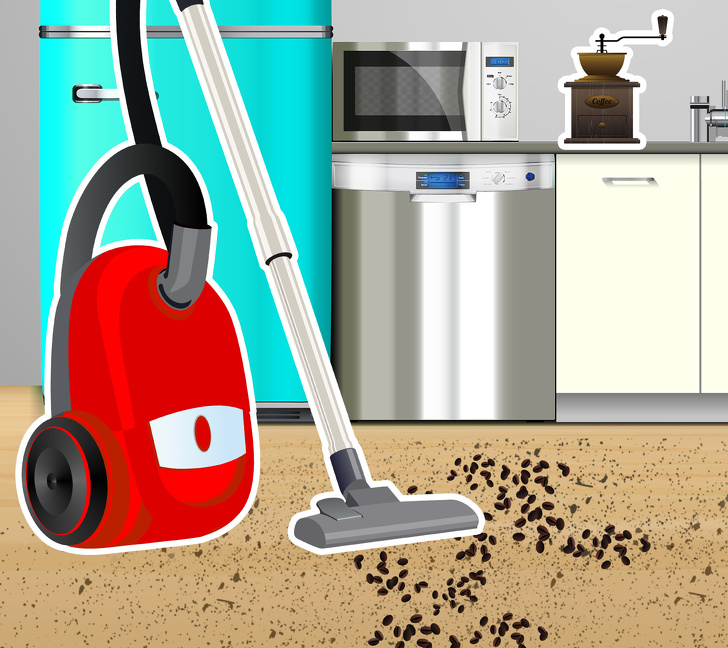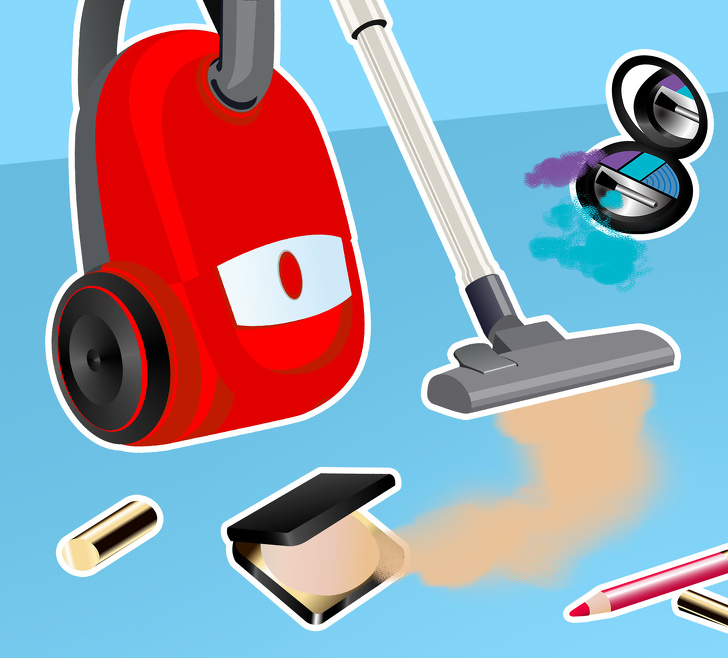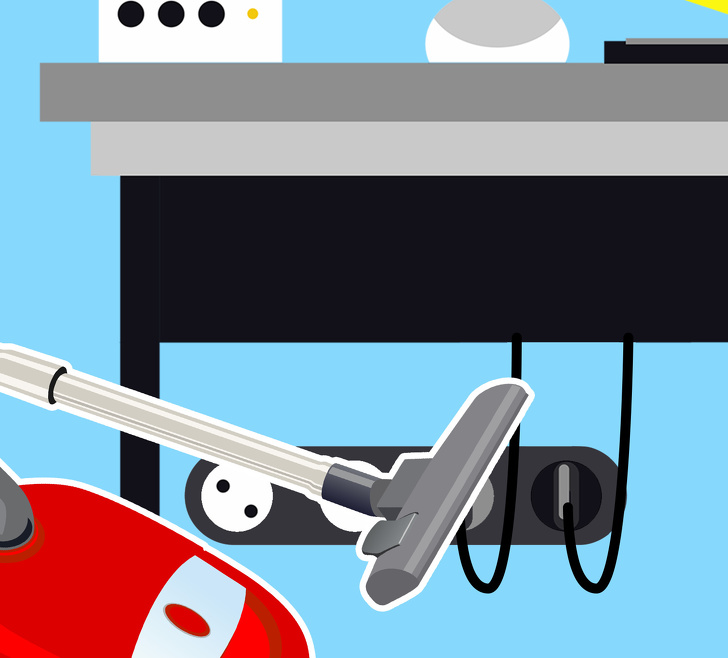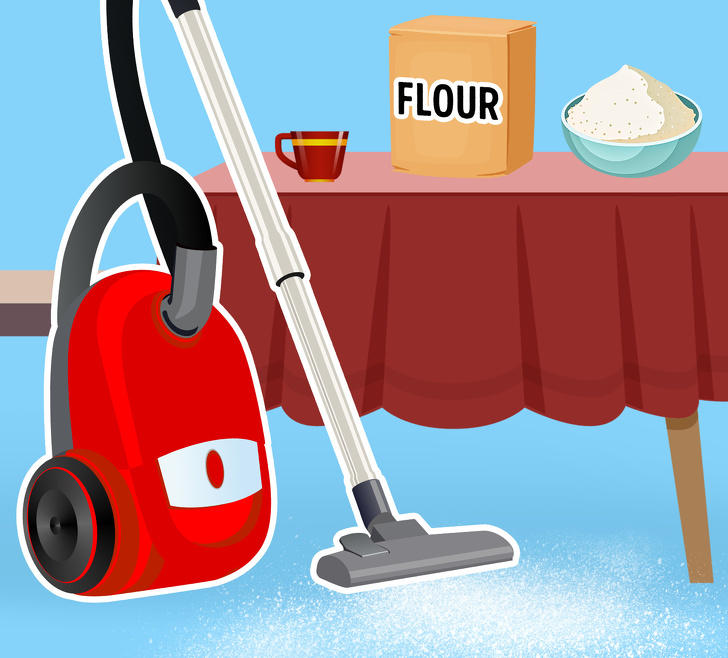Vacuuming up broken or spilled things with a vacuum oftentimes sounds like the best solution, taking into account that many of us have wireless vacuums that can easily replace brooms. However, after a while we might find that our helpful appliance has a bad smell, that its working capacity has significantly decreased, or that it has stopped working altogether, for unknown reasons. And this is definitely because there are some things that shouldn’t be sucked up into a vacuum cleaner.
ViralSection learned about the other things, aside from the mercury from a broken thermometer, that should never be vacuumed.
1. Coffee, coffee grounds, and cocoa

© Depositphotos
© Depositphotos
If you try to vacuum used coffee grounds, this will promote the growth of mold in the dust bin. Used grounds are always wet, even when it seems they are not. In addition, these particles quickly stick to the inner parts of the vacuum and it becomes almost impossible to clean them.
Dry coffee, as well as cocoa, are also dangerous for the vacuum cleaner because their small particles can block the filters. They can also get inside the engine and disable it.
2. Soil and other dry parts of house plants
Have your kids ever tracked soil through the hallway? The first thing we want to grab in this situation is a vacuum cleaner. However, in this case, it’s better to clean the carpet with a brush because the vacuum will push the dirt inside the fluff even deeper and it will be very difficult to get it out.
In addition, if the spilled soil was wet, it can cause some technical issues in the engine. The dried flowers and leaves of indoor plants can easily clog a flexible hose or filter. They also stay moist once they’re inside the vacuum, which can be harmful to different parts of the appliance.
3. Hair
It’s impossible to avoid getting hair inside the vacuum, but it’s still worth watching out for animal fur and human hair and not letting it get into the vacuum in large amounts. They clog the dustbin and filters very fast. Once too much hair gets into the appliance, the power of the vacuum cleaner can greatly decrease — even during one cleaning.
Some wireless vacuum cleaners are equipped with fast, rotating brushes that roll up the hair so much, you will have to disassemble the device or clean the brushes manually.
4. Cosmetics

© Depositphotos
Cosmetic powder, highlighters, and other cosmetics that seem dry, actually contain various oils and substances that start to melt under the influence of hot air. That’s why cosmetics are considered one of the most dangerous enemies of the vacuum cleaner — all because the fat components will melt inside the appliance and clog the mechanical parts and filters. It’s almost impossible to clean the filters once cosmetics get into them and oftentimes you will have to completely replace them.
5. Small paper parts and confetti
Confetti clogs the vacuum very fast, which causes the appliance to get overheated and the engine to stop operating. Confetti that is made out of foil is even more dangerous than paper confetti. The particles quickly melt inside the vacuum under the influence of hot air, get stuck in hard-to-reach places, and stop the vacuum from working.
6. Electrical wires

© Depositphotos
It might seem like a comfortable solution to clean electrical wires with the help of the vacuum, but the nozzles and the sucking power can damage cables and tear small wires. These tears are not always visible and you can end up with a short circuit or an electric shock. That’s why it’s better to avoid cleaning places with piles of wires this way, especially if these piles consist of cables that are different widths (for example, at your desk or in the kitchen).
7. Wet floor
It’s dangerous to vacuum a floor that is too wet or wet food — you can actually get an electrical shock from this. There is also a chance that you could cause a short circuit. If the floor is slightly wet, the vacuum won’t show any reaction from the outside, but this dust will get stiff once it gets to the nozzle and the suction tube. It will break the suction power and a bad smell, that will be hard to get rid of, can appear as well.
8. Small glass particles
The harm that small glass particles might bring to a vacuum seems obvious, but many people still allow themselves to vacuum these small particles. In most cases, after a couple of these cleaning procedures, you will have to change the soft hoses of the vacuum cleaner, the filters, and the bag that collects dust.
Minor damages might not be noticeable at all, but the vacuum won’t be able to keep the dust inside and it will go back out into the freshly cleaned apartment through the damaged parts.
9. Flour

© Depositphotos
© Depositphotos
Experts say that if you need to clean up flour with a vacuum cleaner, pay attention to how much you’re cleaning up. A small handful won’t harm the device, but if you spilled the entire pack, it is better to collect it manually.
Otherwise, it might damage the vacuum: all the filters will get blocked and the flour can get inside the engine and disable it.
We were surprised to learn that the vacuum is not the universal home appliance that we thought it was. Do you vacuum everything in sight or were you aware of the limitations, and do you follow them?
Preview photo credit Depositphotos, Depositphotos





















